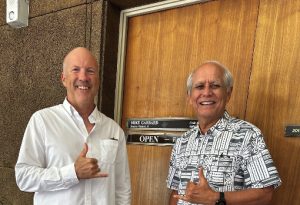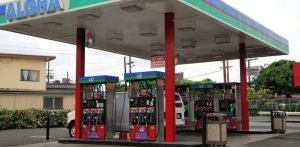
The mission of Think Beyond the Pump, a Hawaii-based non-profit formed in 2022, is to regulate the public health harms and the climate change effects associated with fossil fuel consumption. Greenhouse gas and nitrogen oxides are an invisible threat to human health that comes with every purchase of gas at the pump. The climate change policy research group seeks to implement “warming labels” (gas pump climate-health warning labels) at the point of fossil fuel purchase, to educate consumers on the poorly understood climate and health impacts of fossil fuel combustion. The long-term aim, like U.S. Surgeon General warning labels on cigarettes, is to shift consumer markets away from fossil fuels and highlight the cleaner alternatives. Involved in the warming label effort since 2015, the group is currently seeking legislation that would require warming labels in Hawaii. Such a bill, sponsored by Senator Mike Gabbard, would follow similar successful legislation Cambridge, MA.

From left, TBtP’s James Brooks works with Hawaii State Senator Mike Gabbard on warming label legislation that, according to Gabbard, would send “a strong message and would be a major step toward increasing awareness nationally – even globally. What better way to help educate people on this looming threat, than by setting our beautiful island paradise as an example?”
Think Beyond the Pump believes warming labels will have long-term implications in terms of transportation-related air pollution where the most vulnerable communities tend to live closest to major transportation corridors. According to globalchange.gov, gasoline and diesel emissions increase vector-borne diseases, cardiopulmonary distress, and mental health issues, and TBtP works to inform and encourage consumers to seek low carbon transportation alternatives. The group helped pass a pioneering 2020 law in Cambridge, MA, where bright yellow warming labels on all gas pumps is now law. TBtP subsequently produced the nation’s first public service announcements that further supports the Cambridge label program and shows where the labels are located on the pump. In September 2024, TBtP partnered with Boston College doctors Stylianos Stephanopoulos and Gregg Sparkman in a research study on the efficacy of warming labels. Results of the study could have international implications including health-climate warning labels on all points of fossil fuel purchase such as appliances, ICE (internal combustion engine) vehicles, and utility bills.

In 2023, the Hawaii State Senate passed a bill requiring climate change and health warnings on gas pumps, like those in Cambridge, MA., but was blocked by the House Committee on Energy & Environmental Protection. Stalled in the same committee in 2024, it will be reintroduced in 2025 for further consideration.